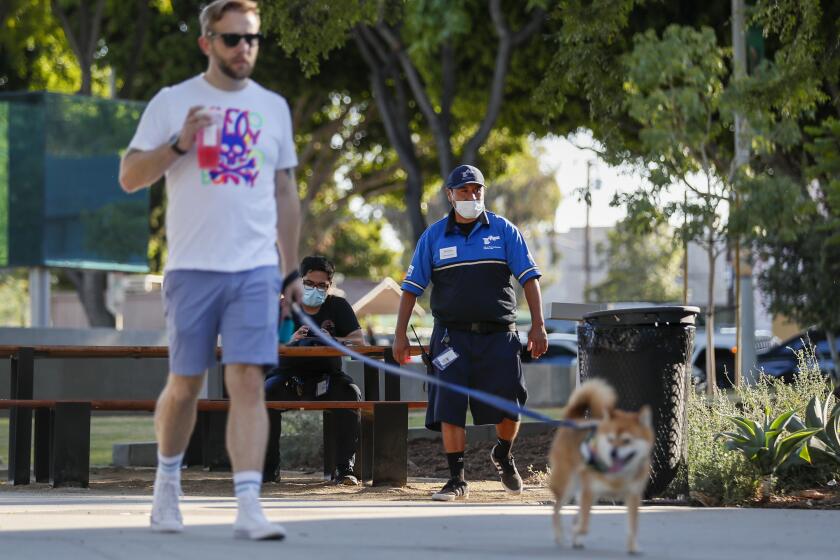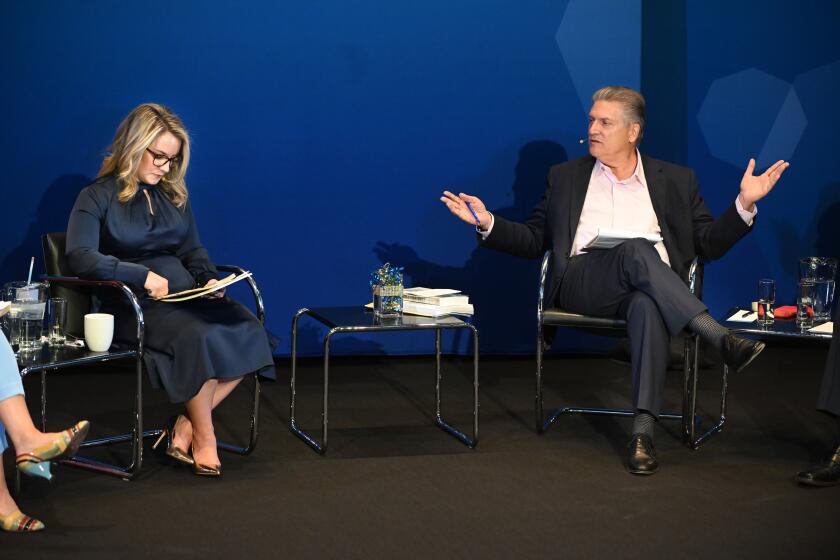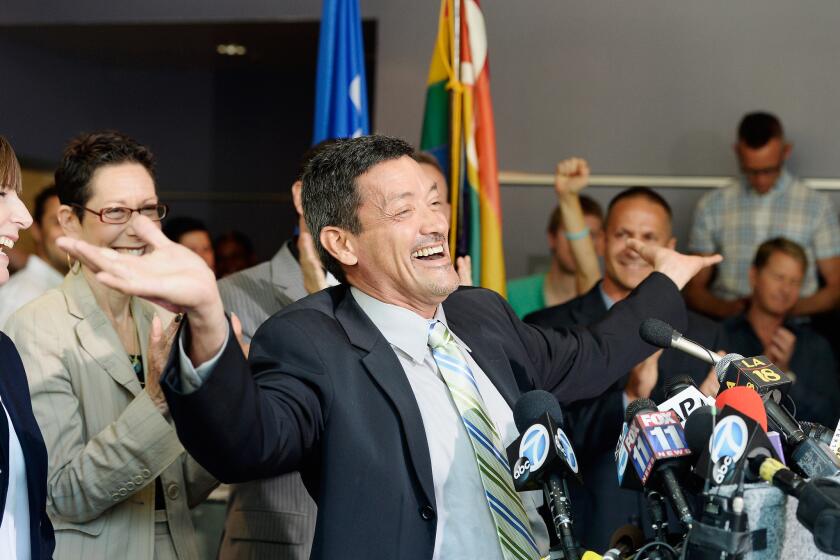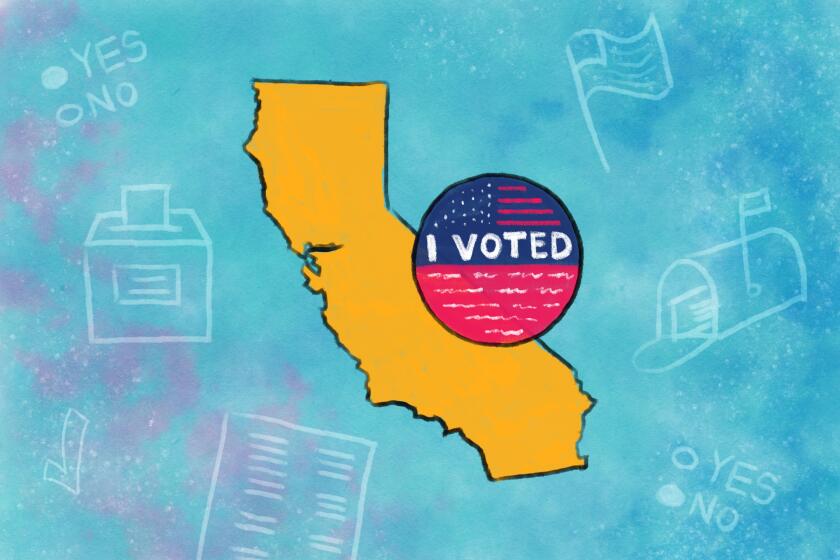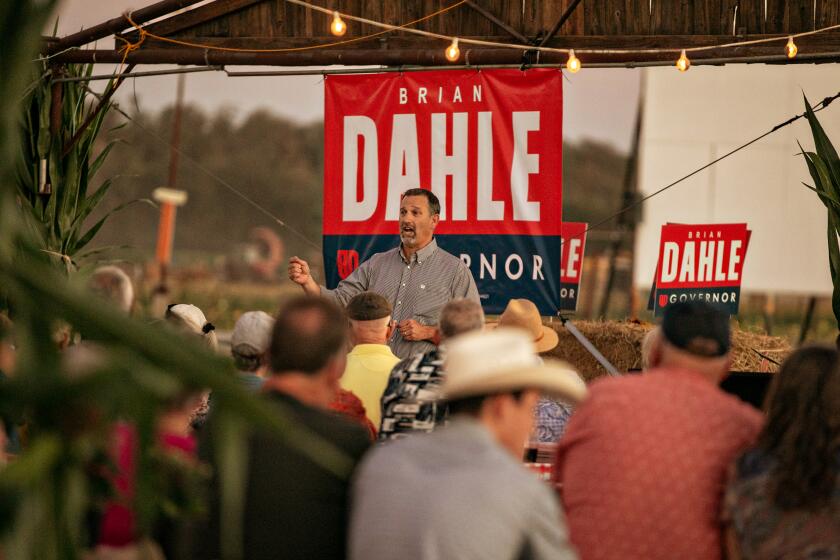West Hollywood gay pioneers clash with younger progressives over future of city
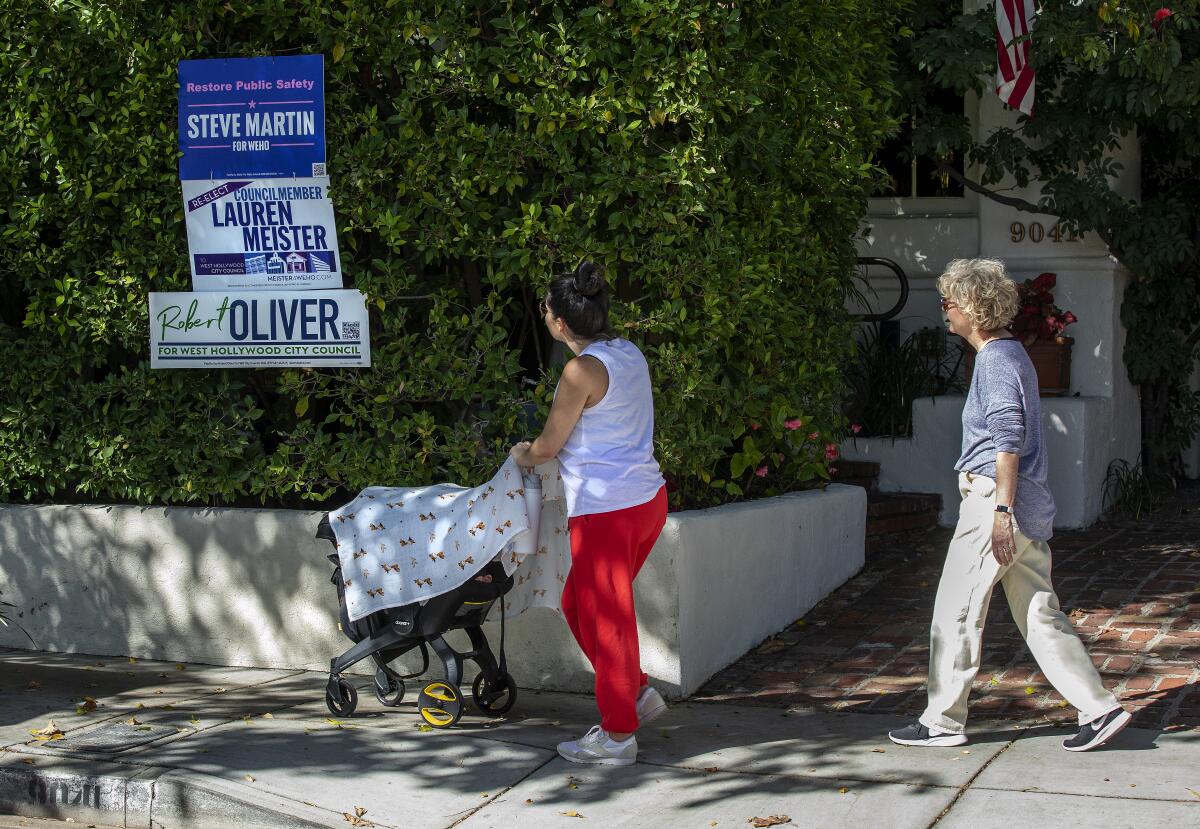
- Share via
John Duran is styling himself as a law-and-order candidate for West Hollywood City Council, posing in front of sheriff’s cruisers on his campaign website and touting his endorsement by the deputies’ union.
It’s a stark contrast from the Duran of the early 1990s, when as a 30-something activist attorney, he helped sue the L.A. County Sheriff’s Department for alleged discrimination against a gay deputy and for withholding medication from a gay jail inmate with AIDS.
Duran, 63, spent two decades on the West Hollywood City Council and is now considered part of the political old guard of this famously liberal, famously gay city, as many younger residents embrace a brand of progressivism far to the left of its founding fathers.
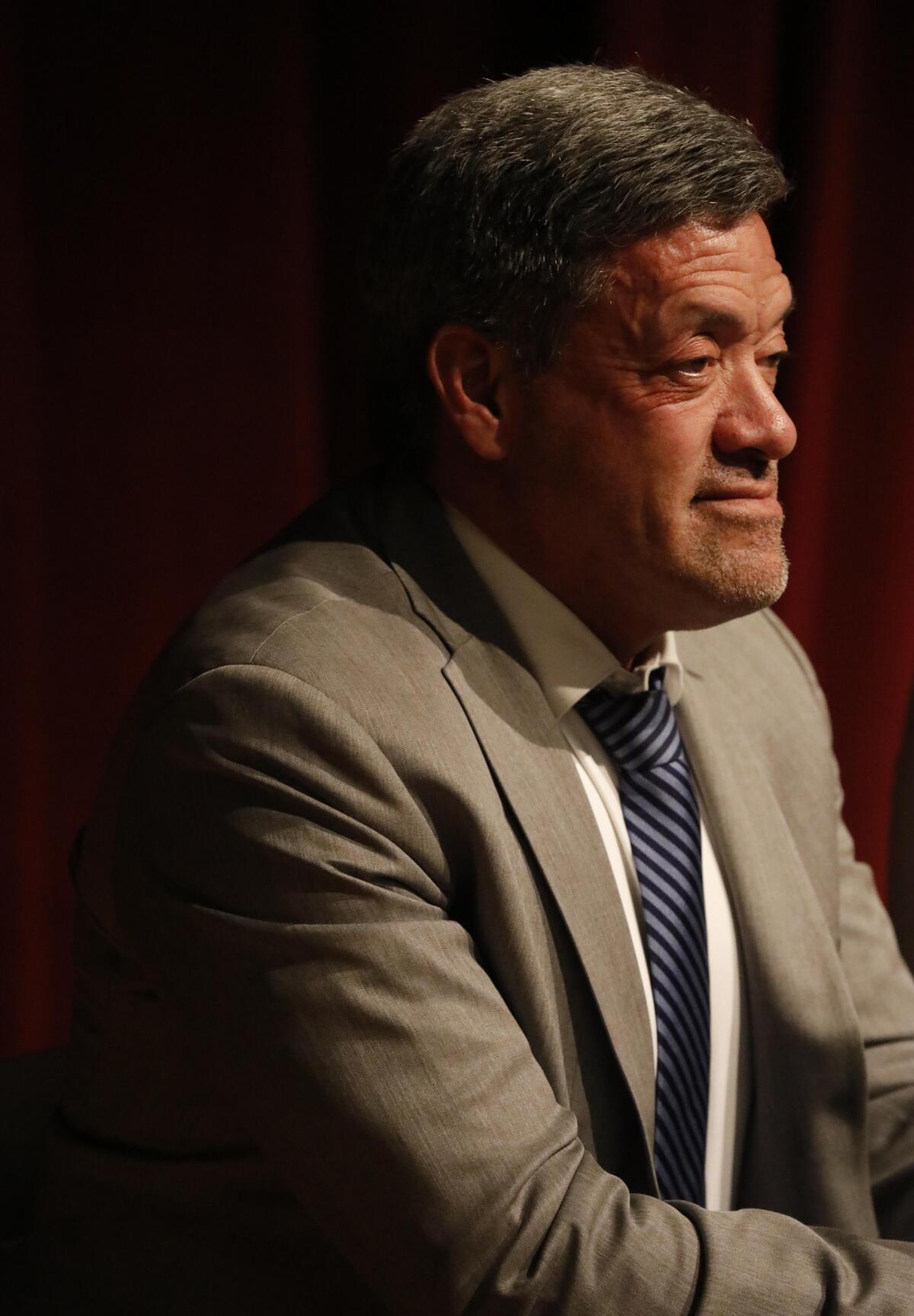
The Nov. 8 election has become a generational battle in West Hollywood, which grabbed international headlines when it incorporated in 1984 with the first City Council in the nation to have an openly gay majority.
With three council seats being contested, many are hurling accusations that the other side has sold out — the moderates to big business and developers, and the progressives to outside activists and labor unions.
Duran and two other former councilmen are hoping to recapture their seats and influence a council they say has veered too far to the left because of its economic policies and decision to scale back sheriff’s staffing.
“Now, I am the quote-unquote conservative, which is bizarre because I’ve been a liberal Democrat almost my whole life,” Duran said. “But compared to what’s out there? I’ve become the moderate voice — pro-sheriff, pro-Chamber [of Commerce], pro-business.”
In 2020, the balance of power shifted on the City Council.
Duran — who was dogged by sexual harassment allegations while in office, including by a former aide he hired after meeting on Grindr and having sex with him — and John Heilman, who had been on the council since the city’s founding, lost their at-large seats to two younger, more liberal candidates.
The famously liberal city’s decision to gradually reduce sheriff’s deputies has thrust it into the culture wars.
On the heels of the national defund the police movement, the council decided this summer to incrementally cut up to four deputies from the West Hollywood sheriff’s station while hiring 30 additional unarmed security guards to monitor the streets.
(The council voted in September to delay reductions planned for that month until December, citing a reduction in crime after more security guards were hired. No deputies have been removed yet — and they would not lose their jobs but would be reassigned within the Sheriff’s Department.)
Last year, the council unanimously voted to implement what was then the highest minimum wage in the country — $17.64 an hour — and to require that full-time workers get at least 96 hours of annual paid sick, vacation or personal leave, with part-time employees getting a proportional amount of paid time off.
The decisions drew the ire of the Chamber of Commerce and residents concerned about crime — and the praise of progressive labor unions and activists who poured into public meetings.
Twelve people are competing for the three at-large seats held by Mayor Lauren Meister, Lindsey Horvath and John D’Amico.
Meister is seeking reelection, Horvath is running for L.A. County supervisor and D’Amico is retiring.
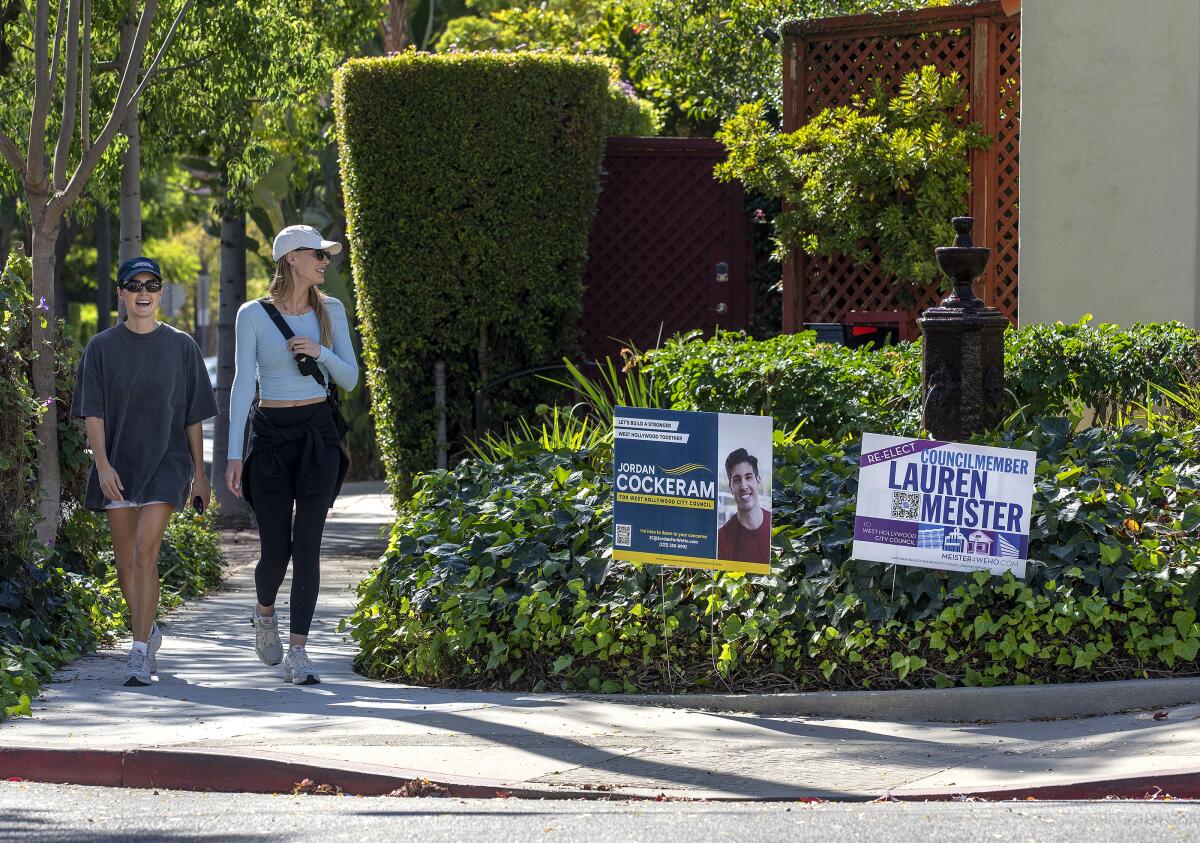
In addition to Duran and Heilman, another former councilman, Steve Martin, is running.
“We’re coming out of COVID, we’re all crabby, and we have this sanctimonious City Council trying to impose their woke world view,” said Martin, 68, who was on the council from 1994 to 2003.
West Hollywood City Councilmember Lindsey Horvath touts her actions, while state Sen. Bob Hertzberg speaks of his negotiating, as skills that make each the ideal L.A. County supervisor.
Martin, who moved to West Hollywood in 1979, is running because he disagrees with the deputy cuts, saying they will make response times slower at a time when residents are worried about crime and homelessness.
In a text message, Heilman, 65, called the deputy reduction “foolish” and said he wants to “help get back to basics.”
Both he and Duran, along with Meister, were endorsed by the Chamber of Commerce’s political action committee and sheriff’s deputies union.
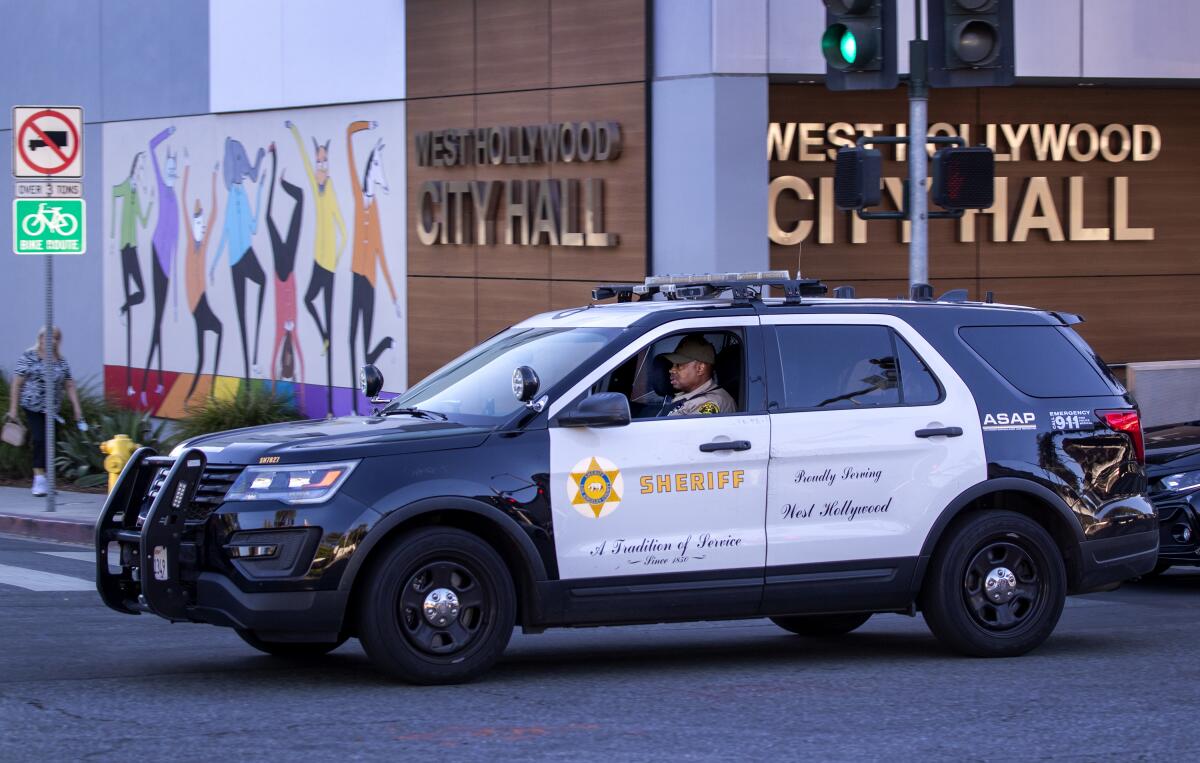
D’Amico, who voted in favor of the deputy reduction, said in an email that he is baffled by the former councilmen’s claims that the current council is overly influenced by outsiders.
“I guess they forget what happened when they pushed for cityhood, domestic partnerships, and [same-sex] marriage — all ideas that were headline grabbing and pushed by outsiders, but it turns out were exactly what was needed next,” he wrote.
D’Amico said he is retiring because he believes the council needs new, young leadership.
Longtime West Hollywood Councilmen John Duran and John Heilman appear to have lost their bids for reelection. Heilman has been on the council since the city was founded in 1984. Duran was first elected in 2001.
“This whole ‘make West Hollywood great again’ campaign by the Chamber of Commerce is a proxy for the developer-driven ideas of the late ‘90s, championed by the current crop of 60-year-old gay guy candidates who are stagnating in their need to be needed,” wrote D’Amico, who is 59 and, like the former councilmen, gay.
Meister, 62, voted against the deputy reductions. A mailer funded by Unite Here Local 11, which represents hospitality workers, features images of her and Duran with grimacing faces. They “just don’t act like Democrats,” the mailer says.
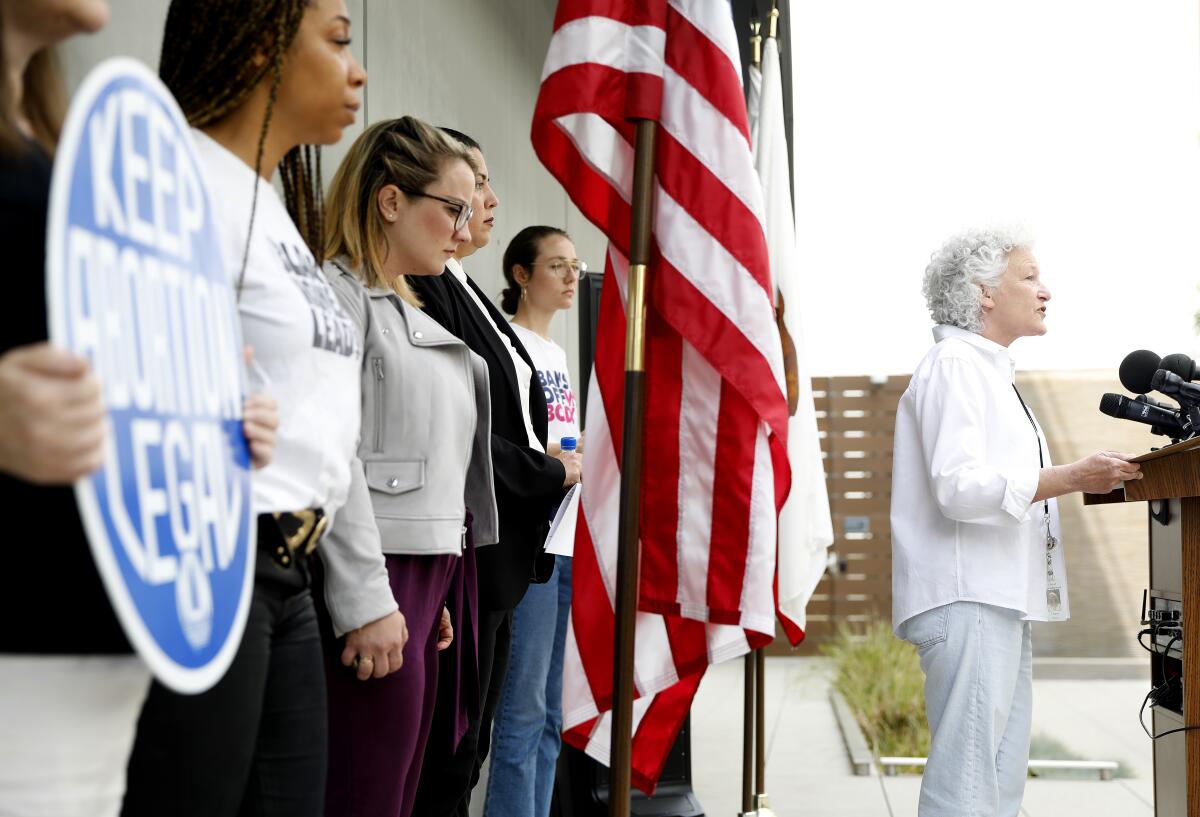
Meister said in an email that while she is a lifelong Democrat, she is “everyone’s council member, not just those from one party.”
“Many are uncomfortable with a new divisiveness that has recently been injected,” she said.
Before she joined the council in 2015, Meister spearheaded a successful 2013 campaign to bring term limits to the council, at a time when all but one member had spent more than a decade in office.
Among the newcomers running for City Council this year is Zekiah Wright, who is endorsed by Unite Here Local 11, which pushed for the minimum wage hike and a hotel workers’ ordinance that limits the daily workload of housekeepers.
The union is also endorsing two other progressive candidates, Robert Oliver and Chelsea Byers.
Wright is originally from Florida and would be the first Black nonbinary person on the council. Sepi Shyne, who is Iranian American and lesbian, became the first queer woman of color when she was elected in 2020.
Wright, a 36-year-old attorney, moved to the city last November precisely because it is such a progressive place.
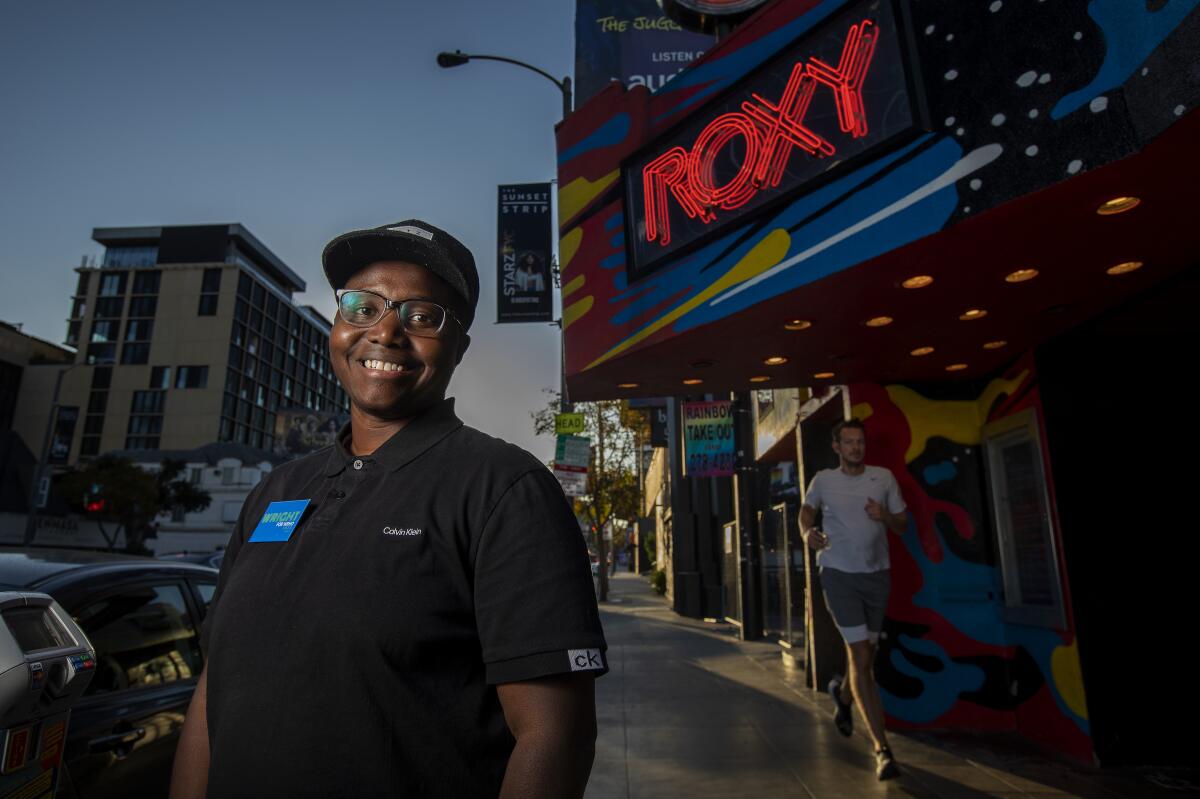
It’s “a city that was so unapologetically queer and affirming,” Wright said. “I want to make sure we’re preserving that so that other folks can come from the South or come from anywhere and see — ‘Oh my god, a community exists where I can feel welcome.’”
Wright supports the decision to hire unarmed security guards to supplement deputies and said the city has to consider alternatives to law enforcement when dealing with unhoused people, especially those experiencing mental health crises.
“We’re relying on sheriffs to do it. It’s not their job; they’re not equipped,” Wright said. “There’s only so much that they can do, especially if the person is not committing a crime.”
Ben Savage, the actor best known for his role in “Boy Meets World,” is another political newcomer aiming to join the council.
Who is running for California governor? What are the propositions on the ballot? Here is your guide to the 2022 midterm election.
Savage, 42, has lived in West Hollywood for 18 years and said he worries about the safety of his elderly neighbors and young relatives. He said he would favor “restoring the proper number” of sheriffs’ deputies to speed emergency response times.
“For me, it’s an all hands on deck approach,” Savage said. “There should be proper funding for sheriffs, but there should also be increased funding for mental health programs, clinical services, and short-term and long-term housing. ... It’s a false choice that there has to be one or the other.”
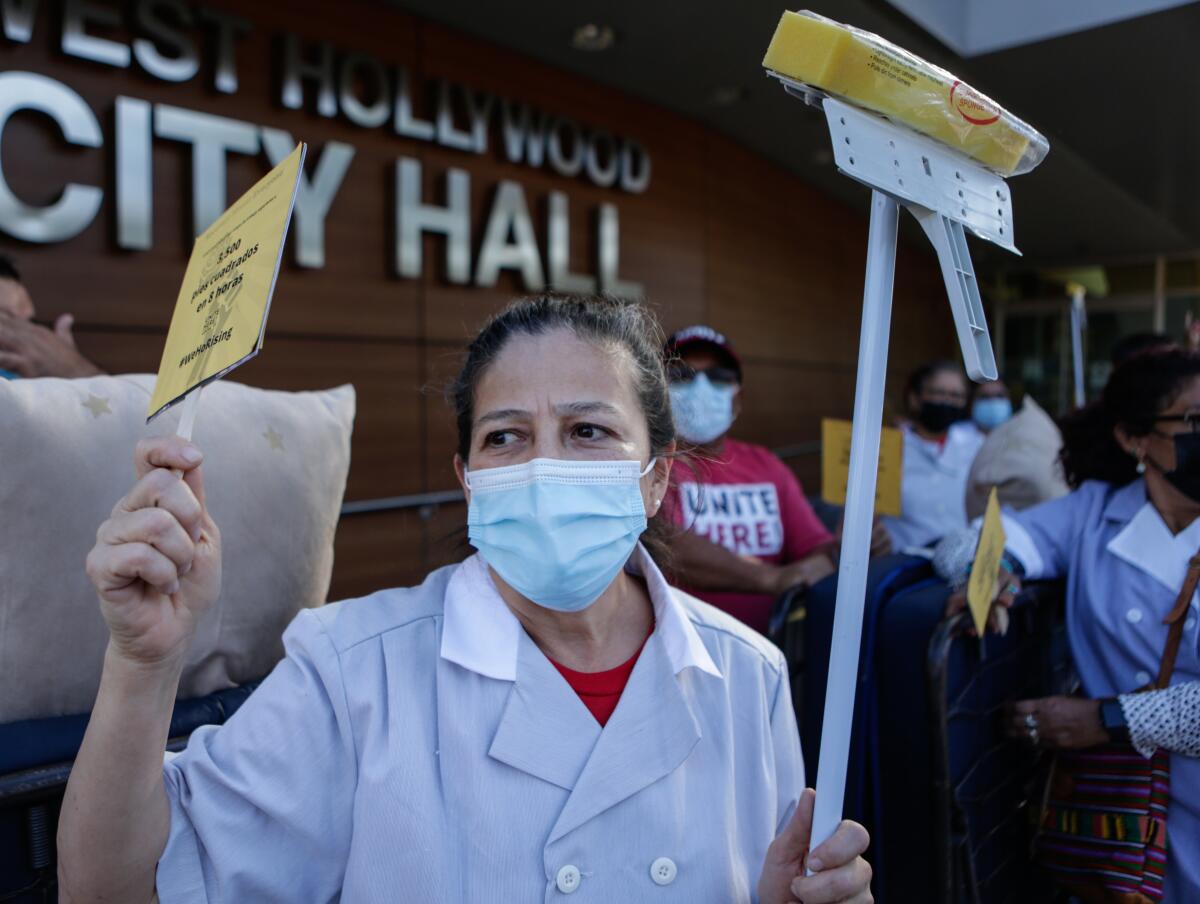
Keith Kaplan, 62, a Realtor and chairperson for WeHo for the People — a Chamber of Commerce-backed coalition that has decried the new progressive policies — said the city has “become hijacked by special interest groups.”
He said the newer council members are overly influenced by Unite Here and are passing “virtue signaling” policies.
Danielle Wilson, a research analyst with Unite Here Local 11 and a West Hollywood renter for three years, said it’s “shocking that people speak about our members as if they don’t live in the city.” About 100 union members live there, she said.
“I think, for some of these folks, it’s hard for them to imagine that a dishwasher or a room attendant or even a banquet server could possibly be their neighbor,” said Wilson, 29.
Polls show that it would take divine intervention for gubernatorial candidate Brian Dahle to defeat Gov. Gavin Newsom in a state where Democrats outnumber Republicans 2 to 1.
The race has exposed some ugly rifts for Albert Muñoz, an organizer for the Writers Guild of America who has lived in West Hollywood since 2019.
Muñoz, 41, voted against the incumbents in 2020 and was proud to see the council reduce the number of sheriff’s deputies and raise the minimum wage. He is disturbed by accusations that those policies are mostly supported by outside interests and not actual residents.
He said there is a generational divide — but also “a divide on being more inclusive of Black and brown people and people with different gender identities.”
The city is 71% white.
“When people are talking about those who are ‘younger,’ that might also be a code for different demographics,” said Muñoz, who is Latino and gay.
He is supporting Wright.
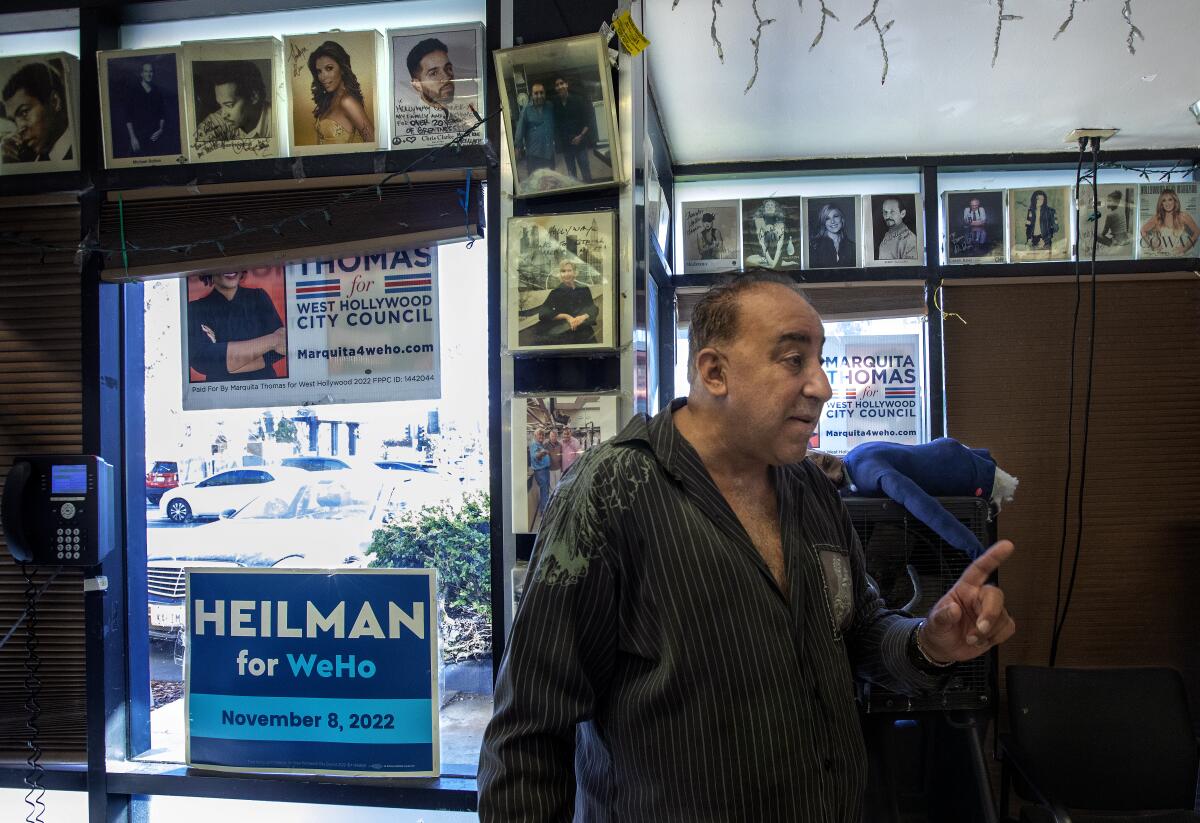
Meanwhile, Karim Amersi, who owns Hollyway Cleaners on Santa Monica Boulevard, likes “pro-business” candidates.
He said he is a moderate — “a Bill Clinton Democrat and Obama Democrat” — but that the council has swung too far to the left.
Amersi, 54, is angry about the deputy reduction. Crime and homelessness feel out of control, he said.
The dry cleaner — where customers have included Madonna, Jay Leno and Leslie Jordan, whose button-down shirt still hung on the rack after his death last month — was purchased by Amersi’s father in 1984.
It used to stay open until midnight. About a year ago, Amersi started closing at 9 p.m. because he thought it was too dangerous for his employees to work late. Cars had been broken into in the parking lot, despite its bright floodlights, and homeless people sleep outside the front door, he said.
A few nights ago, Amersi, who has long worked overnight, arrived at about 2 a.m., and a man who was sleeping outside took out a pocketknife and threatened him.
A few months before that, he said, a homeless man demanded his wallet. Amersi’s young son had left a toy gun in the car, he said, and he pulled it out, successfully deterring the man.
Amersi now lives in Sherman Oaks. But he has West Hollywood political signs plastered all over the dry cleaner’s windows. Among the candidates he likes are Duran, Heilman and Meister.
“I think now we’re at the point where we need experience,” he said.
More to Read
Sign up for Essential California
The most important California stories and recommendations in your inbox every morning.
You may occasionally receive promotional content from the Los Angeles Times.
